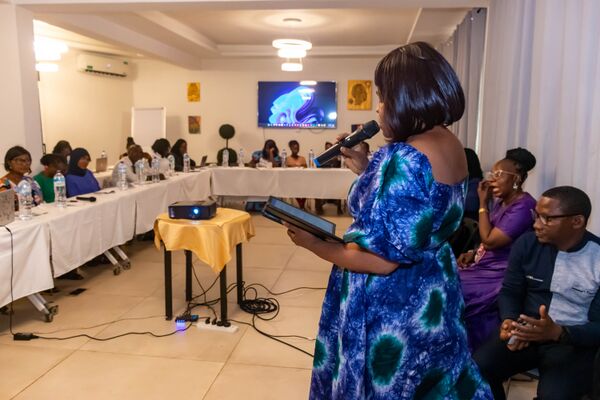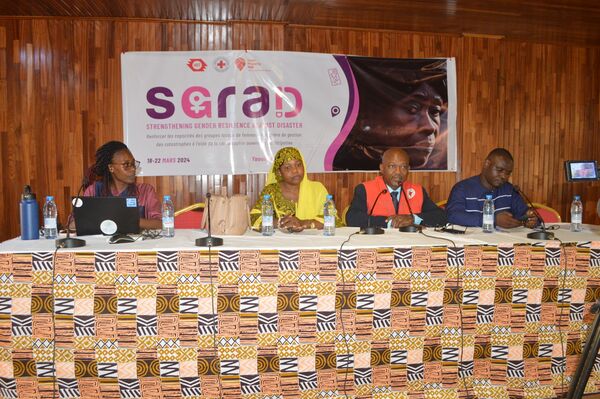SGRAD23
Strengthening Gender Resilience Against Disaster-SGRAD
Disasters, both natural and man-made, can potentially disrupt communities, economies, and ecosystems, leaving lasting impacts on the lives of those affected. It is well-established that these disasters do not affect all members of society equally. Women, men, girls, and boys experience disasters differently due to existing gender norms, social roles, and economic disparities. The concept of "Strengthening Gender Resilience Against Disaster" recognizes the need to address these inequalities and vulnerabilities by integrating a gender-sensitive and inclusive approach into disaster risk reduction, response, and recovery efforts.
The "Strengthening Gender Resilience Against Disaster" project is a comprehensive initiative that addresses the specific vulnerabilities and challenges women and girls face in disaster-prone areas. The project concept involves a gender-sensitive approach to disaster risk reduction, response, and recovery to empower women and promote gender equality in disaster management efforts through open mapping. Activities will include: Training workshops: We will organize workshops to educate women on disaster preparedness, response, and recovery. Focus on evacuation plans, first aid survival skills, and psychological support. Remote Mapping: Arrange disaster simulation exercises to provide hands-on experience for women. These exercises will include remote mapping using a tasking manager and mapping mobile applications Storytelling and Media Campaigns: Encourage women to share their personal stories and experiences related to disasters through storytelling events or digital media campaigns. This can raise awareness and inspire others to take action. Advocacy and Policy Discussions: Organize panel discussions, seminars, or webinars to highlight the specific challenges faced by women in disaster situations. Invite policymakers, experts, and community leaders to discuss policy changes and strategies to address these issues.
Project Overview
Across the African continent, the impacts of disasters are amplified by existing gender disparities, leaving women and girls particularly vulnerable. Deep-rooted social norms, economic inequalities, and limited access to resources create an environment where women and girls face disproportionately severe consequences during disasters. Despite international efforts to address disaster preparedness and response, women and girls' distinct needs and roles often need to be more integrated into strategies, resulting in suboptimal outcomes. In this project, the WNA hub would like to bridge this gap by developing and implementing a comprehensive approach to bolster the resilience of women and girls against various disasters in the West and northern African countries.
Project Objectives:
- Provide women groups with added portfolios to build on disaster resilience
- Map and analyze women's groups/organizations to adapt training materials to their needs.
- Develop strategies and recommendations to enhance the resilience and empowerment of women and children in the face of disasters.
- Build the capacity of 20 women groups in two project countries using a training of trainers approach.
- Provide micro-grants to four women groups to train women and girls and conduct remote mapping activities in their respective communities.
- Support women groups with technical skills and tools to promote open data and tools in their organizations.
- Provide resources and technical support for women groups in Senegal to run activities expressed and documented during the Design Thinking of the “Small Islands” project as an integrated activity.
- Co-develop and organize campaigns to promote women’s involvement in Disaster preparedness, awareness, and response to disasters in their communities.
- Organize workshops bringing together women groups, stakeholders, and national actors and engage in knowledge sharing. and resource opportunities for effective women empowerment
By pursuing these objectives, this project aims to strengthen women and girls' capacity to support disaster preparedness, awareness, and response with an emphasis on gender and children protection. The project will train women groups in disaster preparedness and response using open and participatory mapping methodology and open-source tools and engage partners and stakeholders to support vulnerable groups in the global context of climate change.
2024 Activity Background
Trainings
The Humanitarian OpenStreetMap Team (HOT) West and North African Hub (WNAH) recently organized a five-day training workshop from March 5th to 8th, 2024 in Sierra Leone, followed by another from March 18-22, 2024 in Cameroon. The purpose of the workshop was to equip 80 women's organizations from 40 different groups across two countries with essential disaster management skills and Open Mapping tools. The primary objective was to enhance gender resilience against disasters by teaching women the necessary preparedness, response, and recovery techniques.
During the workshop, participants received training on various aspects of disaster management, including evacuation, first aid, survival skills, risk assessment, hazard identification, and mapping skills. The training also emphasized the significance of promoting open data and tools within their organizations. The intention was to empower these women with the necessary knowledge and skills to effectively manage disasters and become change agents in their respective communities.
Topics and tools covered
The goal of this project is to empower women's organizations at a local level in disaster management and mapping for humanitarian response by using open-source tools. The training sessions included discussions, role-playing exercises, and hands-on mapping sessions. Every participant was encouraged to actively engage during the entire week, ensuring that everyone had a role to play.
- During the second and third days of the training program, participants focused on learning about disaster management. The sessions covered various important topics such as the concept of disaster management, analyzing cycles, risks and hazards, emergency planning, search and rescue, community engagement, and awareness. The sessions were led by local experts from humanitarian organizations such as the Sierra Leonean and Cameroonian Red Cross, the National Disaster Management Agency, Plan Cameroon, and MSF.
- On the fourth day of the training, participants learned about geospatial technologies for remote mapping using OpenStreetMap. They also learned how to use mapping and open data as tools for disaster mitigation, preparedness, and response. The training emphasized an open and participatory approach. During the remote mapping exercise, the trainees used HOT's collaborative tools to map buildings and roads in various towns, including Tasso, Sangbalima, and Tasoku on Tasso Island in Sierra Leone, as well as Melen, Ngoaekele, and Olezoa in Cameroon. They completed this practical exercise using laptops connected to the Internet. Additionally, the trainees joined a webinar session organized by HOT to celebrate International Women's Day.
- On the last day of the event, the participants were eagerly looking forward to a range of activities. These included receiving certificates from HOT, giving press interviews, providing feedback, participating in ice-breakers, and networking with each other. Before engaging in these activities, a group of more than 35 women were divided into teams of five and sent to map commercial and public amenities in the commercial district where Wilkinson, Lumley, and Spur roads intersect. They used the Organic Maps application installed on their phones to do this. The women were able to use the power of open and participatory mapping to improve the city's map. This, in turn, would promote better service delivery for banks, government facilities, restaurants, and other service providers. The organizations that benefited from this initiative were astonished to see women and girls taking the initiative in mapping the city.
Partners
During the "Strengthening Gender Resilience Against Disasters" training, stakeholders played a crucial role in attending weekly sessions. Their contributions were significant in making the training more effective and efficient. They shared their expertise during the sessions and participated in data collection activities by using open mapping tools, which were made possible after appropriate training.
For project implementation, HOT partnered with the National Red Cross of Sierra Leone and Cameroon. They were instrumental in recruiting local women's groups, creating awareness, and co-facilitating the training.
Outcomes and Impact
- This training program is an exemplary model that empowers women groups to become active agents of change in disaster-prone areas. It aims to make a contribution to more resilient and inclusive communities. The training sessions encourage the active involvement of women groups in fostering an inclusive learning environment. Participants are encouraged to share their experiences, concerns, and local knowledge related to disaster management freely. The training sessions include group discussions, simulations, role-playing exercises, practical demonstrations of first aid and emergency skills with case studies, and discussions on gender and disasters. These activities enhance the participants' practical understanding of emergency response procedures and strengthen their teamwork and leadership skills.
- The effectiveness of the training was evaluated and it was found that participants had gained knowledge and confidence in handling disasters, first aid, evacuation, and using mapping tools. Women were able to identify different types of disasters and were connected to stakeholders, enabling them to form partnerships and collaborate on opportunities they may require.
- In an interview, one of the participants, Mariama Ibrahim, said that the disaster and open data mapping training was valuable and informative. She also mentioned that the trainers were highly knowledgeable and the group exercises deepened her understanding. She further emphasized the importance of disaster response and recovery efforts.
- The training provides valuable insights into mapping techniques and tools that can be utilized in disaster management. Florence Margai, on her part, expressed her gratitude for the opportunity to participate in the training and would highly recommend it to others interested in disaster management and open mapping.
- Overall, the five-day training program was exciting, informative, and beneficial to the women organizations.
The Strengthening Gender Resilience Against Disaster project has successfully achieved its objectives of empowering and equipping local women's groups with the necessary skills, resources, and tools to build resilience and respond effectively to disasters in their communities and beyond. As part of the project, these women will be connected with potential partners, including the OpenStreetMap Community. They will also be provided with microgrants to expand the project's activities to other local women's groups and be involved in HOT's Gender Equality thematic areas for future opportunities.

